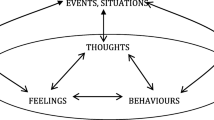Abstract
One hundred fifty-nine patients' (121 women and 38 men, mean age 35.1 (SD = 7.6) own descriptions of problems that brought them to psychotherapy, as described during a clinical interview, were classified into three categories: symptoms, relations, and a mix of these two categories. Length of problem formulation in millimeters was another variable of interest. Diagnostic and Statistical Manual, fourth edition (DSM-IV) diagnosis of the patients was assessed during the same clinical interview. As expected, a relationship between patients' own problem formulations and type of recommended psychotherapy in a naturalistic setting was detected. Length of problem formulations was related, as expected, to type of recommended psychotherapy. No significant relationship between recommendation and DSM-IV Diagnosis Axis II, Axis V, and Axis I, with the exception of anxiety disorders, was disclosed. The results are discussed in terms of Gaw and Butler's model of systematic treatment selection (1995) and the Tallman and Bohart (1999) theory of client as active self-healer.
Similar content being viewed by others
REFERENCES
American Psychiatric Association (1994). Diagnostic and Statistical Manual of Mental Disorders. Washington, DC.
Arnow, B. A., & Castonguay, L. G. (1996). Treatment goals and strategies of cognitivebehavioral and psychodynamic therapists: A naturalistic investigation. Journal of Psychotherapy Integration, 6, 333–347.
Beutler, L. E. (1986). Systematic eclectic psychotherapy. In J. C. Nocross (Ed.), Handbook of eclectic psychotherapy (pp. 94–131). New York: Brunner/Mazel.
Bohart, A. C., & Tallman, K. (1999). How clients make therapy work: The process of active self-healing. Washington, DC: American Psychological Association.
Frank, J. D. (1995). Psychotherapy as rhetoric: Some implications. Clinical Psychology: Science and Practice, 2, 90–93.
Gaw, K. F.,& Beutler. L. E. (1995). Integrating treatment recommendations. In L. E. Beutler& M. R. Berren (Eds.), Integrative assessment of adult personality (pp. 280–319). New York: The Guilford Press.
Garfield, S. L. (1995). Research on client variables in psychotherapy. In L. E. Beutler & M. R. Berren (Eds.), Integrative assessment of adult personality (pp. 190–229). New York: The Guilford Press.
Hill, D. J., & Bale, R. M. (1980). Development of the Mental Health Locus of Control and Mental Health Locus of Origin Scales. Journal of Personality Assessment, 44(2), 148–156.
Hubble, M. A., Duncan, B. L., & Miller, S. C. (1999). Directing attention to what works. In M. A. Hubble, B. L. Duncan, & S. D. Miller (Eds.), The Heart Soul of Change (pp. 407–447). Washington, DC: American Psychological Association.
Orlinsky, D. E., Willutzki, U., Meyerberg, J., Cierpka, M., Buchheim, P., & Ambuhl, H. (1996). Quality of the therapeutic relationship: Do common factors in psychotherapy correspond with common characteristics of psychotherapists? SPR Collaborative Research Network. Psychotherapie, Psychosomatik, Medizinische Psychologie, 46, 102–110.
Öst, L. G. (1979) Reliabilitetsmätning vid observationer och skattningar. Nordisk Tidskrift för beteendeterapi, 8, 133–159.
Roth, A. R., & Fonagy, P. (1996). What works for whom? A critical review of psychotherapy research. New York: The Guilford Press.
Author information
Authors and Affiliations
Rights and permissions
About this article
Cite this article
Zuber, I. Patients' Own Problem Formulations and Recommendations for Psychotherapy. Journal of Psychotherapy Integration 10, 403–414 (2000). https://doi.org/10.1023/A:1009431217143
Issue Date:
DOI: https://doi.org/10.1023/A:1009431217143




